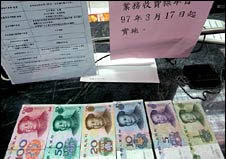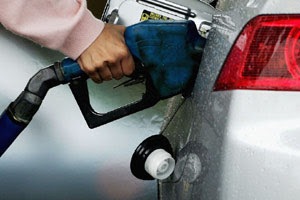 Taiwan has lifted some restrictions on Chinese currency exchange, in another sign of improving bilateral ties.
Taiwan has lifted some restrictions on Chinese currency exchange, in another sign of improving bilateral ties.
The move is part of a number of financial liberalisation measures agreed by the government last week.
It follows a pledge by Taiwan's new President, Ma Ying-jeou, to promote better economic ties with China, which sees Taiwan as part of its territory.
For the first time, Chinese bank notes will be officially available at authorised Taiwanese banks.
They will also be available at foreign-currency trading counters at tourist hotels, airports and gift stores.
Tourist influx
The move comes just a few days before the start of regular direct weekend charter flights between Taiwan and China - marking a new chapter in relations between the two political rivals.
But the step is also considered a virtual necessity, since from next month up to 3,000 Chinese tourists will be allowed to visit Taiwan each day.
The move will provide a legal channel for them to exchange their money for local currency to spend in Taiwan.
The absence of a currency exchange service between Taiwan and China had led to rampant black market currency trading.
Under the new regulations, anyone will be able to buy or sell Chinese yuan at authorised institutions, although the government has initially set a cap of 20,000 yuan - just under $3,000 (£1,500) - for each transaction.
Yuan conversion by institutions and companies will still be barred.
In the longer term, it is hoped that officials from Taiwan and China will be able to negotiate currency settlement agreements to provide mechanisms for normalising cross-strait currency clearance.
Until now, the conversion of Chinese currency could only take place on Taiwan's outlying islands of Matsu and Kinmen.



















































